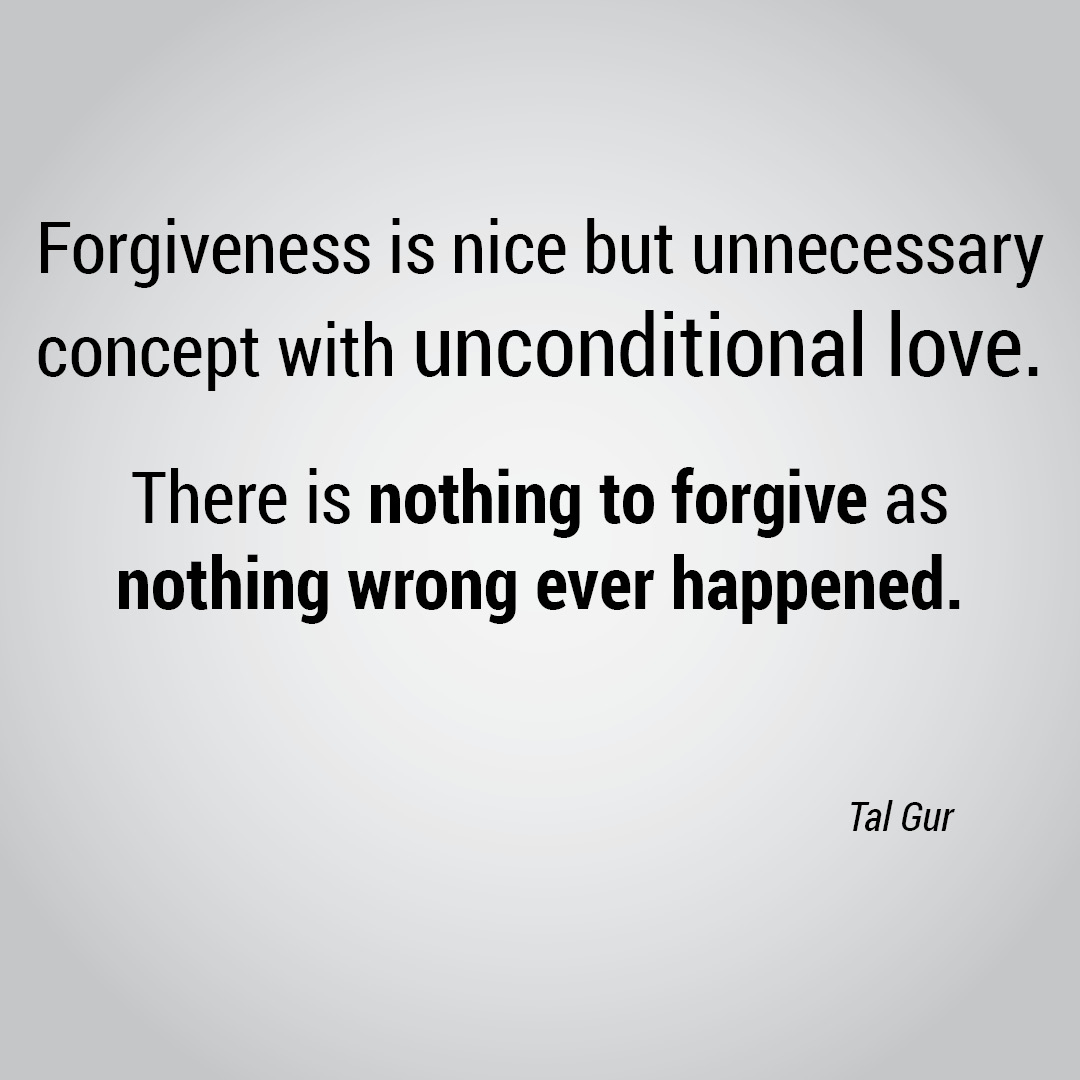Forgiveness is nice but unnecessary concept with unconditional love. There is nothing to forgive as nothing wrong ever happened
This quote is about love and acceptance on a profound level, a love so deep that it leaves no room for grudges, resentment, or the need for forgiveness... This doesn't mean one should not take acation when harmful or destructive behavior is present, but rather implies embracing a perspective of understanding that allows love to thrive without conditions.
Forgiveness, in its basic sense, is the act of pardoning someone for a wrong they've done. But if you're operating from a place of unconditional love, any perceived wrongdoings aren't seen as offenses that need pardoning. Why? Because they're accepted as part of the person you love. It's like saying, "I love you just as you are, and nothing you do or say can alter that." Thus, the act of forgiveness becomes less necessary because there's a sense of acceptance that precedes it.
This quote implies a perspective where, in the grand tapestry of life, there are no mistakes, only learning experiences. Every action, every decision, every so-called "wrongdoing" is a step on our journey, a necessary piece of our individual growth and evolution. So, there's no real need for forgiveness, because there was never any real wrong to begin with. We're all just learning and growing as we navigate through life.
***
Picture this: you're strolling through a lush, vibrant forest, the kind of place where every step feels like a discovery. With each breath, you're soaking in the beauty, the peace, and the sense of belonging. But then, you stumble over a hidden root. For a moment, that stumble feels like the whole world has shifted off its axis. But here's the catch - does the forest apologize for the root? Do you hold a grudge against the tree? No. You simply adjust your stride and continue, embracing the forest's beauty as if nothing happened. That's the essence of unconditional love.
Unconditional love is like the sun that doesn't choose who to shine on. It's a love so vast and deep that it sees beyond the mistakes, the missteps, and the misunderstandings. In a world filled with unconditional love, forgiveness becomes an obsolete concept, not because we're turning a blind eye to wrongdoings, but because our capacity to love encompasses and transforms them.
Imagine two friends, Alex and Jamie. They've been inseparable since childhood, sharing everything from secrets to dreams. One day, due to a misunderstanding, Alex says something hurtful to Jamie. In a typical scenario, this could lead to resentment, a demand for an apology, or even the end of a friendship. But if Alex and Jamie share unconditional love, Jamie understands that Alex's words were not the heart of their friendship but a slip on the surface. Jamie doesn't see something to forgive because their bond, their shared love, is stronger than a momentary lapse.
Unconditional love doesn't mean you ignore the pain or pretend it doesn't exist. It means you understand that everyone is walking their own path, fighting their own battles, and sometimes, they trip. Sometimes, they might even cause you to stumble. But with unconditional love, you pick each other up, dust off the leaves, and keep walking together.
This way of loving teaches us to see the world not as a place of constant judgment and retribution but as a canvas of understanding and acceptance. It challenges us to look beyond our immediate reactions and embrace a more compassionate, empathetic view of life.
So, how do we cultivate this profound love in our lives? Start small. Practice looking at a situation from the other person's perspective. When someone cuts you off in traffic, instead of immediately reacting with anger, consider the myriad reasons they might be in a hurry. When a friend forgets an important date, remember the times they were there when it truly mattered.
The journey toward unconditional love is not about ignoring the wrongs but about transforming our reactions to them. It's about building a world where the roots in the forest are not obstacles but part of the adventure, where every stumble is a step toward deeper understanding and connection.
**Actionable Question:**
What step can you take today to view a recent misunderstanding or hurt through the lens of unconditional love, transforming it into an opportunity for growth and deeper connection?
Chief Editor
 Tal Gur is an author, founder, and impact-driven entrepreneur at heart. After trading his daily grind for a life of his own daring design, he spent a decade pursuing 100 major life goals around the globe. His journey and most recent book, The Art of Fully Living, has led him to found Elevate Society.
Tal Gur is an author, founder, and impact-driven entrepreneur at heart. After trading his daily grind for a life of his own daring design, he spent a decade pursuing 100 major life goals around the globe. His journey and most recent book, The Art of Fully Living, has led him to found Elevate Society.





















